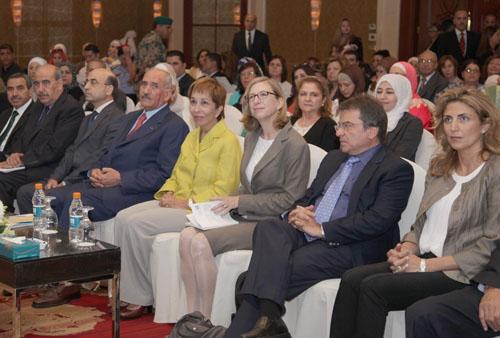You are here
Jordan’s pay equity achievements ‘first step towards future’
By Ana V. Ibáñez Prieto - Nov 15,2018 - Last updated at Nov 15,2018
AMMAN — Minister of Labour Samir Murad on Thursday stressed the ministry’s will to “transform Jordan into the regional leader in the promotion of pay equity between genders”.
The minister highlighted the draft labour law of 2010 and its amendments for achieving pay equity, which are currently being discussed in the House.
The minister’s remarks came during the Pay Equity Forum 2018 held by the National Committee for Pay Equity (NCPE), in cooperation with the International Labour Organisation (ILO), which celebrated the committee’s accomplishments in the promotion of gender equality in the workplace.
The forum gathered stakeholders from governmental institutions and civil society organisations. It featured discussions on the future commitments and directions of pay equity, and working groups on digital payment enforcement, collective agreements and contracts and the national gender pay gap.
During his inaugural speech, Murad expressed his gratitude towards both organisations for their support on the empowerment of Jordanian women, as well as their assistance in the application of the ILO conventions on pay equity and gender discrimination at work.
“We are gathered here today not only to look at our achievements, but to find the best solutions and draft new methods to continue improving pay equity in the Kingdom,” the minister added.
Ambassador of Norway to Jordan Tone Allers commended Jordan on being the first Arab country to join the Equal Pay International Coalition, stressing “the tangible results of the Labour Law in line with the ILO conventions on gender, the fruitful partnerships between the UN, local NGOs and female workers in the private education sector, as well as the successful use of technology to implement new measures towards gender equality”.
“But these achievements are only a first step,” the ambassador continued, expressing her hopes to “see commitments renewed by the end of the forum”.
The forum also featured co-founder of the Stand Up with Teachers campaign Nareeman Shawaeen, who elaborated on the establishment of the campaign in 2015 to help female teachers working in private schools ensure their basic labour rights were respected.
Head of the Directorate for Working Women at the Ministry of Labour Eman Akor noted that the joint efforts of the campaign with the labour and education ministries materialised in September of this year with the new Regulation of Registration and Licencing of Private and International Schools.
The new measure, which was endorsed by the government in late August, will safeguard the salaries of private school teachers by requiring employers to deposit their salaries electronically through bank transfers or e-wallets, sources from the campaign told The Jordan Times.
“The new regulation guarantees that teachers will receive the salaries they have signed previously with their employers,” ILO gender consultant Reem Aslan noted, adding that “e-payments will also ensure that the teachers are enrolled in the Social Security Corporation [SSC] and that they remain registered during the summer break, preventing interruptions in their salary and SSC contributions”.
In this regard, Murad noted that the Ministry of Labour is responsible for following up on the implementation of the amended system through the Directorate of Inspection and its departments, stressing that the new system is “one of the great achievements of the NCPE and its initiatives”.
Gender specialist at the ILO Regional Office of Arab States, Frida Khan, pointed out the differences between gender pay gap and gender discrimination in the workplace, explaining that “pay gap doesn’t always mean that women are getting paid less than men in the same position, but rather a structural problem where women on average get paid less than men”.
“This can be due to barriers in education, access to employment or occupational segregation — but even if we get to tackle those, the gender pay gap could still remain due to factors that cannot be clearly assessed and are rather social — such as pay discrimination and stereotypes,” the specialist added.
Related Articles
The ILO and Jordan’s National Committee on Pay Equity (NCPE) on Tuesday endorsed an action plan to ensure the long-term sustainability of efforts to promote the principle of equal pay for work of equal value.
AMMAN – Officials, lawmakers, educators and labour rights activities gathered on Tuesday to address the issue of unfair wages for private sc
AMMAN — The National Committee on Pay Equity (NCPE) on Saturday held the first social dialogue session on the collective bargaining agreemen















